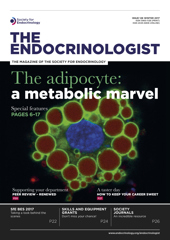The Society’s Interdepartmental Peer Review scheme is a voluntary, supportive and nonconfrontational review of endocrine services. The scheme was inspired by John Wass (Oxford) when he was Chair of the Society for Endocrinology’s Clinical Committee in 2002, set up by the Society for Endocrinology, led by John Bevan (Aberdeen) and then Petros Perros (Newcastle upon Tyne).
The scheme allows both a subjective and objective look into a centre’s achievements and difficulties. The idea of the programme is to ensure safe and sustainable services and facilitate improvements, negotiating a difficult financial climate. It focuses on the clinical care process and organisational aspects of care, and promotes examples of exceptional practice.
The current peer review programme is undergoing change, and I have been given the opportunity to continue the work of Petros Perros to develop the programme further with the assistance of the peer review team.
WHAT ARE THE ADVANTAGES OF PARTICIPATING?
Peer review can help support the changes that are most wanted by endocrine units, paying attention to local NHS priorities for change. It is an opportunity to reflect on current practice, build morale within the team and recognise the centre’s achievements, whilst benchmarking against national data. It also provides a platform to reassure patients that there has been external validation and to promote the specialist service within the trust. Appraisal and sharing ideas with experienced clinical endocrinologists are important, and 100% of centres that have participated have found it useful.
With an ambition to review all specialist endocrinology centres in the UK, there is a great opportunity for exchanging ideas, which will help strengthen the specialty, improve networking and promote good practice.
WHAT IS THE FUTURE OF PEER REVIEW?
It is recognised that centres offer a range of routine, specialist and superspecialist endocrinology and don’t always follow a binary model between the nearest ‘tertiary centre’ and ‘secondary care’. To reflect this continuum, the traditional model of pairing a ‘tertiary’ centre with a ‘district general hospital’ has been replaced to allow single centres to be reviewed.
The self-assessment questionnaire has been streamlined to acknowledge the time pressures in current clinical practice, and there is a timeline of up to 3 years for planning visits, to allow an adequate period for preparation and identifying appropriate reviewers. The focus has changed to put more emphasis on clinical outcomes, and links to other quality measures are being established. There will also be development of a platform through the Society for Endocrinology to share resources and experiences and promote good practice and ideas.
WHAT DETERS CENTRES FROM BEING REVIEWED?
There continues to be enthusiasm about being peer reviewed and the importance of the process. The main concern about participating has been the amount of time and hard work that are perceived to be involved in gathering the data, in services which are already stretched. The self-assessment questionnaire has been refined to reflect this. Tristan Richardson, who has recently been through the process in Bournemouth, said that data gathering took around 8 hours for two consultants, plus nurse time and support from the management team. Again, having a focus within a realistic time frame allows the data to be gathered without tight deadlines, and the benefits of being reviewed make it worth the effort.
There is also a misconception that centres must ‘put their house in order’ before they are peer reviewed. Reviewing the services when a newly recruited consultant comes to the department can help strategy. Setting a future timeline helps focus on the necessary changes and a realistic time to achieve them. Even if targets are not met prior to peer review, the report can help reflect some of the difficulties that the departments have struggled with, as a mechanism for helping achieve change.
WHO HAS BEEN PEER REVIEWED?
The hospitals that have been peer reviewed are shown at www.endocrinology.org/clinical-practice/interdepartmentalpeer-review. Their catchment areas range from 280,000 to 2.5 million, and they see between 267 and 1,530 new referrals per year. Of the centres reviewed, 100% felt it was worthwhile and would volunteer again. There was a similar level of satisfaction from reviewers and a great deal to be learnt from sharing practice.
HOW IS THE PEER REVIEW ASSESSMENT MADE?
Preparation for the visit involves filling in a self-assessment questionnaire about the centre and gathering relevant documents and protocols. The visit then occurs over the course of a day, and is conducted by two experienced clinical endocrinologists and two senior endocrine nurse specialists. The reviewers would be matched as closely as possibly for suitability to the centre. The peer review team will visit the facilities and interview clinical, secretarial and managerial staff and key clinicians of allied specialties. The quality of care is then reviewed according to set standards.
The degree of specialisation of services, the quality of interaction across departments and the ability to work with other endocrine teams locally, regionally and nationally will be assessed, with a strong emphasis on evidence of a patient-centred service. There is an opportunity to compare the data acquired with national statistics to allow benchmarking of structure of services and number of patients seen.
The report is tough and thorough. Not all of the essential standards, and only around half of the desirable standards, have been met by centres that have been reviewed, so there is still work to be done, but there are many examples of excellent practice to celebrate. All reports are confidential, but there is a chance to highlight areas of specialist expertise to enhance.
LOOKING FORWARD
I am indebted to Petros Perros for leaving solid foundations, upon which I can build with the peer review team. As mentioned above, we have recently conducted a review in Bournemouth, where colleagues found it extremely useful for clinical practice. Plymouth, St Thomas’ Hospital and Chelsea and Westminster Hospital have all expressed an interest in being next. This is, by definition, a collaborative effort and relies on endocrinologists and centres stepping forward to be reviewed and to be reviewers. I have no doubt that there are huge amounts to learn from each other and I look forward to the opportunity to be able to highlight good practice through the individual trusts and the Society for Endocrinology in the future.
If you would like further information about being reviewed or becoming a reviewer please contact Natasha Archer at the Society for Endocrinology ([email protected]) or Antonia Brooke at the Royal Devon and Exeter Hospital ([email protected]). See also the Society webpage.
Antonia Brooke, Clinical Lead for Peer Review – Endocrinology, Royal Devon and Exeter Hospital, UK







